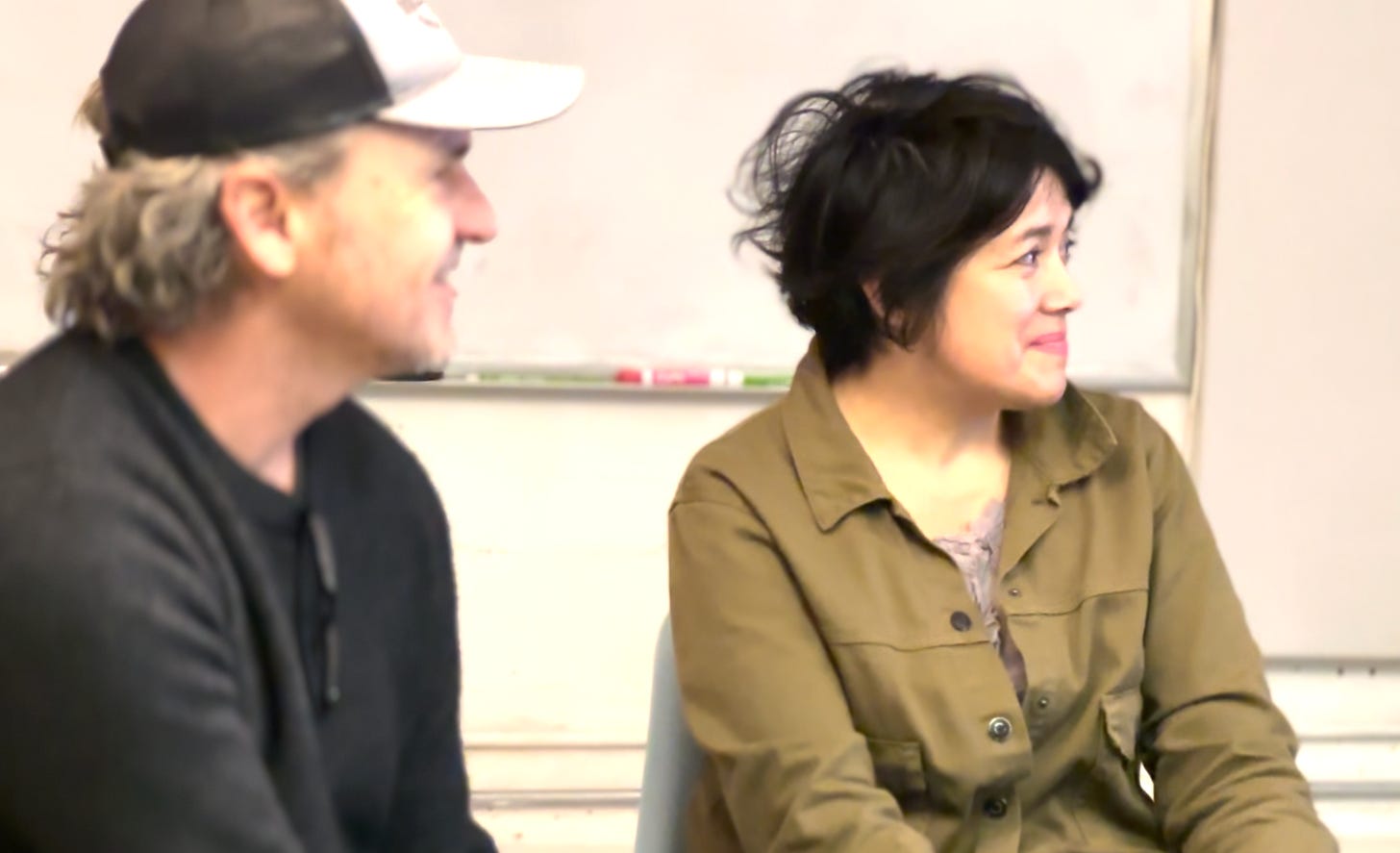
A conversation between Natasha Boas and Caterina Fake
Natasha Boas: The act of bringing a bed into a gallery–a private haven par excellence in a public space-carries so much meaning and engages with so many stories, fantasies, fears and desires. What happens in the act of sleeping in the bed in the gallery?
Caterina Fake: The first installation of Bed for Dreaming was at gallerist Aida Jones’s house, who generously agreed to host dreamers. It was installed in a home so that people would feel safe sleeping there. Aida acted as a proxy for “The Great Mother,” analogous to the goddess figures from different spiritual and cultural traditions that fill the room—protective figures, goddesses of compassion. We called our sleepers “the dreamers” and wanted them to feel safe in unconditional positive regard.
When Bed for Dreaming traveled to Minnesota Street Project, it was not possible for people to sleep there, and while we could create darkness, there could be no actual candles. In place of dreaming, our dreamers can use the “dream objects” to tell their stories on the sand table. And many dreams have been sent to me, dreamed elsewhere.
I created Bed for Dreaming as a response to the suffering in the world that we don’t have the means to handle. Nowhere is safe. Threat and crisis surrounds us. We are so scared and broken. We spend hours doomscrolling in a perpetual state of alarm. Throughout all this, we have lost connection to ourselves, our depth, our inner world. The installation invites visitors into that world, with hopes to create a sense of safety and calm, beauty and mystery.
NB: What does candlelight make possible that electric light doesn’t? What do colors and shadows from candlelight do to change perception? What happens in the dark that can not happen in the light of day?
CF: One marvelous writer on the subject of darkness is Junichiro Tanizaki in his book In Praise of Shadows. The darkness in Japanese homes of the pre-modern era were intentionally dark, and all of the beautiful furnishings and statues, the statues, the lacquer bowls, the gilding were meant to be seen by candlelight. As were the white painted faces of women who wore green-black lipstick.
He praises not only the beautiful interiors but also the dark—but perfectly clean—bathrooms of his youth, which today have become blindingly bright, illuminated with electric light like operating theaters, as if the dirt of our humanity can be exposed and expunged and disinfected. A whiteness that only tolerates the perfect, the shiny and new. Against it everything old looks dirty and corrupt.
David Batchelor in his book Chromophobia describes the home of an art collector which was seamlessly white with a white so white it was not even bleached, but was itself bleach.
Bed for Dreaming rebels against this state of affairs, against the tendency towards purification, whiteness and the intolerance of flaw, fault, or blemish. We see this appear in so many ways in our culture, not only in contemporary design, but also in the incessant judgment, purity tests and virtue-signaling.
The installation was completely transformed at Minnesota Street Project because of the tremendous contrast of the darkness and dim light of the show with the bright white of the rest of the building. Bed for Dreaming encourages people to be dappled, imperfect, odd, sensual, beautiful, human. To praise all things counter, original, spare, strange.
NB: Dreaming is a gift that we all do not have access to. Scientists say everyone dreams, but not everyone remembers. What happens if a guest does not remember their dreams and has problems sleeping in such a context?
CF: I was always amazed that any of the guests at Sophie Calle’s 1979 work The Sleepers were able to sleep at all, what with her sitting in the room with them and photographing them every hour! It’s like that Tehching Hsieh clock-punching piece—no sleep. Carsten Hollers installed a bed in the Guggenheim. Even wrapped in that snail shell, how could you sleep? Didn’t Tilda Swinton sleep in a picture window once? Fortunately our dreamers were solid sleepers.
I am a polyphasic sleeper and sleep in two sleeps. Most people slept this way before electric light and the exigencies of a scheduled work day. That interstice between sleeps puts you in a hynogogic state, between dreaming and wakefulness, and it is where a lot of creativity, vision and imagination lives. I have my best ideas then, during the witching hour, the hour of the wolf. “Witching Hour” is the name of the Benjamin Moore paint we put on the walls at the Minnesota Street Project.
NB: What will you do with the dream journal recordings? Do they become artifacts for future installations?
CF: All the dreams that were written in the dream journal and I that have received from others are gifts. Many of our dreams are pedestrian and extensions of our waking life, but often they are numinous, as if we had traveled in a timeless realm, gone down into the underworld, met the immortals, touched the infinite. Everyone has a magic dream.
From among the dreams I will make future artworks, whether they be future installations, paintings, sculptures or films remains to be seen. I have already sketched plans for some of them. This is ongoing work. I am planning a show about portals, this place between, the liminal and the threshold, the gates of heaven or hell, the entry to the underworld. I have a proposal for another show called Temple of Dreams. Ferran Miquel has composed music based on the dreams which he will be playing at the end of the installation of Bed for Dreaming and we are collaborating on a surrealist opera.
NB: We both love the book From the Mixed-Up Files of Mrs. Basil E. Frankweiler, the children’s novel by E. L. Konigsburg about the siblings who run away from home to live in the Metropolitan Museum of Art in New York City, and become engrossed in solving the mystery of an enigmatic statue they believe might be a Michelangelo.
The Musée Picasso in Paris project invites artists into the museum to spend the night and write or make work about it. It flips your script in a way. People do want to be surrounded by art! That must be why there is such a collective fantasy around sleeping in museums.
CF: Yes! There seems to be a developing idea around this. There is also a book published by Fern Books, Like a Sky Inside, about a writer who finds a way to spend the night at the Louvre. And I understand this desire well, because yes, I read and reread From the Mixed-Up Files of Mrs. Basil E. Frankweiler as a child, repeatedly checking it out of the library. I would think about it every time I went to the Met or any other museum. Because I wanted to live surrounded by art: The Mountain, Fragmentary Head of a Queen, tapestries, medieval drinking games, Madame X, the Egyptian sarcophagi–all of it. It’s one of the most beautiful and best places in the world. I am willing to go with “best”. Best place in the world. Who wouldn’t want to sleep there?
…………..
Bed for Dreaming will be at The Minnesota Street Project at 1275 Minnesota Street, San Francisco through January 30, 2026 Tu-Sat 11-6. There will be an artist talk on January 29, 2026 at 6:30 PM at MSP.
Please send dreams to bedfordreaming@gmail.com













